Etched into the stone facade of 138 South Oxford Street in Brooklyn are the words “Visiting Nurse Association.” An art deco relic from the year 1930, the building still bears the name of its original tenants, who occupied the space for 70 years, until it was purchased by the Alliance of Resident Theatres (A.R.T./New York) in 2000. As a physically disabled person entering this space and confronting its history, I was acutely aware that in another time I may have been a patient of the now-bygone visiting nurses, confined to an apartment or a bed in an institution somewhere.
But on this particular Tuesday evening in March, the halls of South Oxford Space echoed with music. The melody from a second floor piano floated down to the sidewalk below, while voices sang an anthemic medley of Alicia Keys’s “Girl on Fire,” Sara Bareilles’s “Brave,” Katy Perry’s “Roar,” and Rachel Platten’s “Fight Song.” This was my introduction to EPIC Players.

I had been invited to sit in on rehearsals for the company’s “EPIC Heroes,” a cabaret benefit and five-year anniversary celebration, which would have its premiere at Lincoln Center on April 2 (World Autism Awareness Day), as well as for EPIC’s upcoming production of The 25th Annual Putnam County Spelling Bee (starting tonight, May 12, and running through May 22 at A.R.T./NY’s Mezzanine Theatre in Manhattan).
EPIC Players—the name stands for “empower, perform, include, create”—is a nonprofit theatre company made up of neurodiverse and neurotypical artists committed to shining a professional spotlight on neurodiverse and disabled talent, normalizing inclusion, and fostering equity onstage. From the moment I entered the rehearsal room, I felt like I was witnessing something special. As a rookie journalist, I’m used to being a fly on the wall, making myself small and unassuming. Initially I wasn’t sure how I would be received by the cast, and whether they would feel comfortable speaking with me, since I was essentially a stranger with a camera.
Immediately someone offered me a chair, asked all about me and how I was doing, as if they had known me forever. They introduced me to the room, everyone greeted me enthusiastically, and suddenly I was a part of something. I felt welcome. I felt safe. There’s a relief that washes over you when you realize you don’t have to hide anymore. I took off my blazer and let go of the tension in my shoulders. I stopped worrying about my posture or the way that I walked, whether I looked palsied, whether anyone would notice, whether they would mind. I focused on the music, and it all started to make sense.
EPIC’s founding executive and artistic director, Aubrie Therrien, started the company in 2016 after working in the industry as an actor for 18 years. “I really just felt kind of disenchanted by it and unfulfilled,” Therrien told me, “and I’d always wanted to do something more.”
This desire led Therrien to help her mother, a teacher and reading specialist for students with disabilities, conduct play workshops with her classes using scripts adapted from books in the reading curriculum. Therrien explained, “We saw students who had serious processing issues, social issues, and overall confidence issues. These kids were told that maybe they can’t, and we came in and said, ‘No, you can.’”
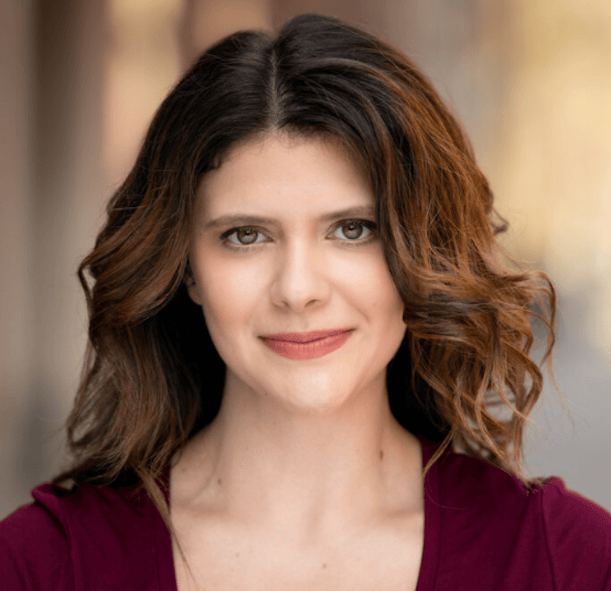
Therrien found that, when given a role, the educational tools, a place to be included, and an opportunity to have fun, these students found new confidence and creativity. “My mom was shocked,” she said, “because these kids were transformed. They memorized lines, they got onstage in front of the entire school, which is courageous. It takes courage to be an actor.”
It also takes courage to stand up for what you believe is important. Inspired by the talent she saw in her mother’s classroom, Therrien began working with drama therapy programs. Yet again, she kept thinking, “There’s got to be something more.”
In a society where individuals living with developmental disabilities are often underpaid and underrepresented in the workplace; where only 2 percent of roles in the entertainment industry are written for characters living with any kind of disability, and where, of those roles, 94 percent are played by able-bodied or neurotypical actors; where Actor’s Equity acknowledges the “near-invisibility” of disabled union members, and where the mighty few who have chosen to openly identify as disabled are consistently paid below industry average—Therrien is right. There’s got to be something more.
“I kept seeing that our actors wanted more,” she said. “They wanted to be seen professionally, they wanted to be paid, they wanted to be taken seriously. So that’s how EPIC was started, from that need, and then it grew very, very quickly.”
In the five years since it began, EPIC is has increased its offerings to include mainstage productions, musical cabarets, original showcases, free skills-based classes, and career resources, with the aim of increasing employment opportunities, pioneering increased inclusion in the arts, and breaking down social stigmas surrounding neurodiverse communities. All EPIC company members are paid (except for one volunteer who prefers to be retired and refuses payment). EPIC’s funding, which comes from a mix of philanthropic giving, individual donations, government funding, and corporate sponsorships, allows the company to keep classes free and make sure everyone is paid fairly.
On the day I visited EPIC to watch a rehearsal of the cabaret, some of the cast were being shot by Confidanz photographers as part of a program designed to build artists’ on-camera confidence. Cast members wore outfits and stood in poses that made them feel heroic, with looks ranging from a full superhero suit to a velvet cape, or even their favorite shirt. Dress for the job you want, as they say.
As with most of EPIC’s cabaret performances, “EPIC Heroes” would feature mostly the performers’ personal selections. “We ask our actors to bring in at least two songs they feel are appropriate for the theme,” said Therrien. In this case, the mandate was to find songs that “remind them of being heroic…or make them feel brave or powerful.” The results ranged from Hairspray’s “Good Morning Baltimore” to Foo Fighters’ “My Hero.”
One actor-selected number was an original song by company member Nick Barberio titled “Superheroes,” which came out of a devised theatre class exercise. Inspired by his personal journey of being diagnosed with autism at 48, Barberio explained that the song is for anyone who has trouble expressing themselves or questions their own power. A lifelong songwriter, costume designer, video editor, and former child magician who auditioned for EPIC in July 2020, Barberio is finding camaraderie, creativity, and self-acceptance despite finding his place on the autism spectrum later in life.
“It was a simple activity: Think of the superhero that you are and do a pose or something that your superhero would take. So I was thinking, what if you don’t feel like you’re a superhero?” Barberio said.
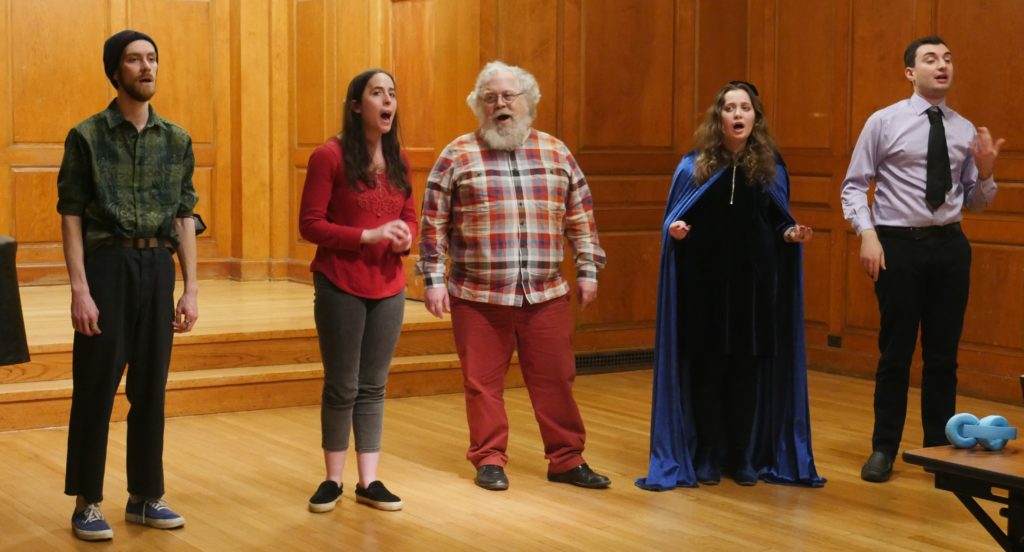
Barberio’s video editing skills came in handy when the pandemic hit, as he helped the company produce virtual programming, including a production of She Kills Monsters (for which he was also tasked with costuming). Therrien said that EPIC didn’t have to cancel a single class due to COVID, and Spelling Bee assistant director Max Baudish noted that “we now have more remote EPIC players that tune into virtual classes, and we’ve kept a virtual component.”
On the day of cabaret performance at Lincoln Center, company member Will Ketter confessed to me, “It really doesn’t quite feel real.” His girlfriend, he said, works as an usher at Lincoln Center, but to perform there? “That’s a huge deal,” he marveled.
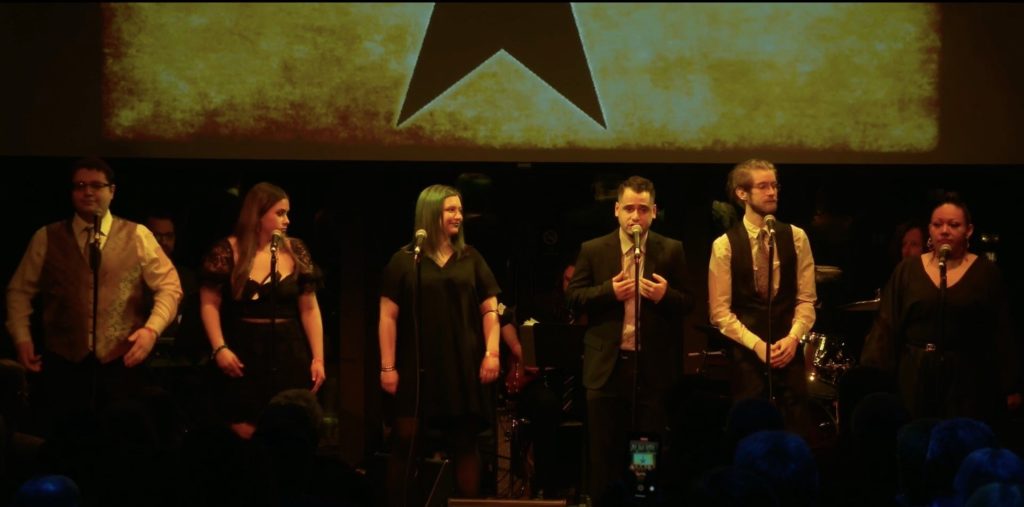
Inside the atrium at Lincoln Center on April 2, there was a feeling of profound connection, of closeness, of being brought together again after a long time apart. A cocktail hour included complimentary goodie bags, themed cocktails, and raffle tickets. The entire company was dressed in EPIC’s colors, purple and black. Cast members sang side by side with Broadway alums Derek Klena, Rebecca Kuznick, DeAnne Stewart, and Jake David Smith, for what Therrien called “a true neuro-inclusive audience. It’s theatregoers who have heard about us, its elected officials, it’s folks in this wonderful diaspora of a city who are interested and know it’s going to be a good show and want to see more.”
The event, which raised over $180,000 for EPIC, involved a fair amount of behind-the-scenes heroics. When some cast members tested positive for COVID-19 and were unable to perform, EPIC players Eric Fegan, Katie Ivie, Will Ketter, Kylie Hogrefe, and Sarah Kaufman stepped up and learned new material at the last minute.
One of the fearless fill-ins, Sarah Kaufman, performed “There Won’t Be Trumpets” after only learning the song the day before.
“I went up and I made my Lincoln Center debut with a song that I had learned less than 24 hours earlier,” Kaufman marveled. They were so willing to fill in, they said, because of the support and respect they received from the EPIC community. “It was because Aubrie took care of me,” Kaufman said. “And because they respected my artistic views and because they respected my tendency to speak up, not just for myself, but for my fellow performers, that I was so willing to jump in and save them when they needed me.”
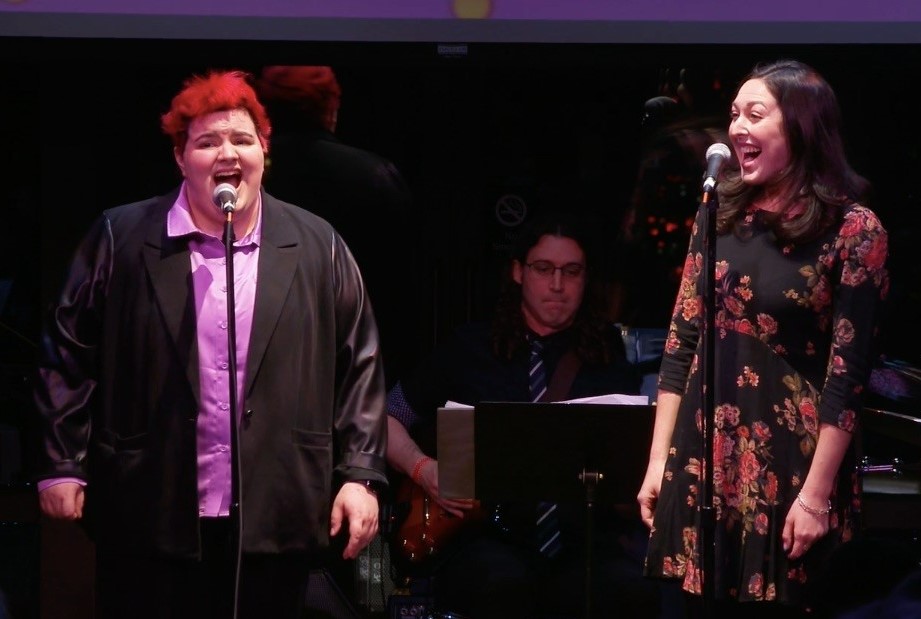
EPIC’s work begins from a place of mutual assurance, understanding, and trust. Explained Therrien, “When you’re not focusing on the disability, you’re focusing on a task, and we’re focusing on assigning it. Also believing in them—saying, ‘I believe you can do this. I’m assuming you have competence and confidence in this, and I’m going to watch you do it.’ And I think that is a profound testament for any kind of student or person who has been told their entire life that they can’t.”
As a disabled person who has often been told that I can’t, who has been dismissed, misjudged, cut from the number, laughed off the stage, and somehow simultaneously told that “fair is not equal” and “life is not fair,” I find some comfort in EPIC’s mission. I know from experience that when enough people, particularly those with authority or influence, communicate through words or actions that you can’t, that you don’t belong, that you are not enough, it’s not long before you start to believe it.
“It’s really important for us to build community,” Therrien said. “Theatre can be really toxic and really ableist. For a long time, you had those old-school theatre professors who wanted to rip you apart to build you up. That’s toxic. And I think that just because it’s been done like that for so long doesn’t mean it’s right. There’s a different way that you can do theatre and be successful.”
Ellie Sondock, a company member since 2019 and assistant choreographer for Spelling Bee, now lists autism on her résumé as a superpower. But she has heard her share of discouraging words, including being told by a theatre instructor, “You don’t get accommodations in the real world, so you’re not getting accommodations in my classroom.”
Said Sondock, “I was still closeted in my autism and really ashamed and insecure, so I thought ‘He’s right. I need to stop asking for accommodations.’”
When ableism adds obstacles, in an industry with already limited opportunities and resources, disabled artists don’t always feel they have the freedom to speak up. So Sondock struggled with the choice of whether to be open about her autism. “Often I would think to myself, Why would they hire me, an autistic individual, when they could hire someone ‘normal’ and not have to deal with all this stuff? I have sensory issues, issues with clothing, and with sound. I always didn’t want to be labeled as less capable, or hard to work with, or any of those labels that can make you less castable.”
A big part of EPIC’s mission is helping players embrace differences, advocate for their needs, and be the most authentic versions of themselves. It is all a part of reframing stigmas so that disability and the diversity of lived experience are seen as valuable assets, not liabilities.
“I’ve been much more comfortable speaking about what I need since working with EPIC,” said Ketter, who is on the autism spectrum and is an associate producer at the Seeing Place Theater. “I used to think that I had no needs, and then I started to realize that I did, actually, and that I should probably talk about them. Even if they seem small in comparison. There’s no big and small in access, there’s just yes or no.”
There can be a lot of pressure for autistic people to perform neurotypical behaviors and suppress symptoms in order to assimilate or fit in. But EPIC offers a space for authentic expression.
“EPIC really helped me find a community in which to be myself,” Sondock said. “When I first joined EPIC, I was very guarded. Because I had never really been around so many autistic individuals in my life. Also, everyone was just being so authentically themselves that it scared me. I was like, ‘How are they so themselves?’ But I feel like I have taken a page from them. I’ve learned how to be more myself. EPIC really helped me find a community of other autistic and disabled individuals, and they taught me how to be openly autistic.”
“I feel very comfortable here,” Ketter added. “I don’t feel like an imposter here. I feel like an imposter in a lot of places.”
That’s not to say that building an inclusive community is without its challenges. Disability is not a monolithic experience, and neurodiversity exists across a spectrum.
“It’s really hard,” Ketter admitted. “One of the first things that I learned joining this company was that accessibility is not easy, it’s really messy, and it’s really complicated. There are a lot of times when my version of autism actually directly conflicts with someone else’s, and we become a problem for each other. And there’s no easy solution to that. So just putting us all in a space together and letting us work on that is an enormous opportunity. I came here and I was like, ‘Oh, this is where I belong, this is what I’ve been trying to do for so long,’ and then, ’Oh, my goodness, it’s difficult.’ I didn’t anticipate that.”
Even within the disability community, people can make assumptions about what neurodiversity looks like.
“When I joined EPIC,” Sondock explained, “no one thought I had autism. They all thought I was just a neurotypical person. And that was another thing that was hard for me too. I was like, ‘My own community doesn’t even recognize me!’ I think it was because I was masking so hard. I had learned to mask so hard that I had stowed away all my little tics and things. I sometimes feel too autistic for the neurotypical world and not autistic enough for the neurodiverse world.”
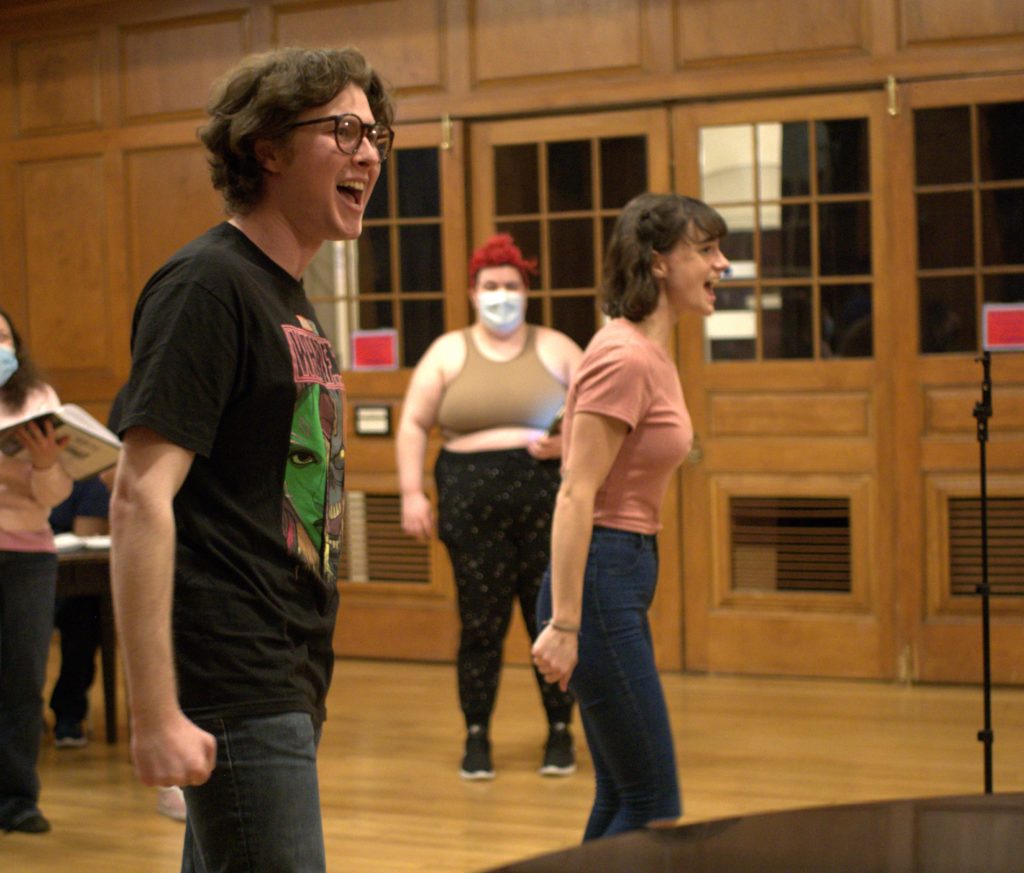
Two spellers face off at the Bee. (Connor Tague & Claire Mercier) 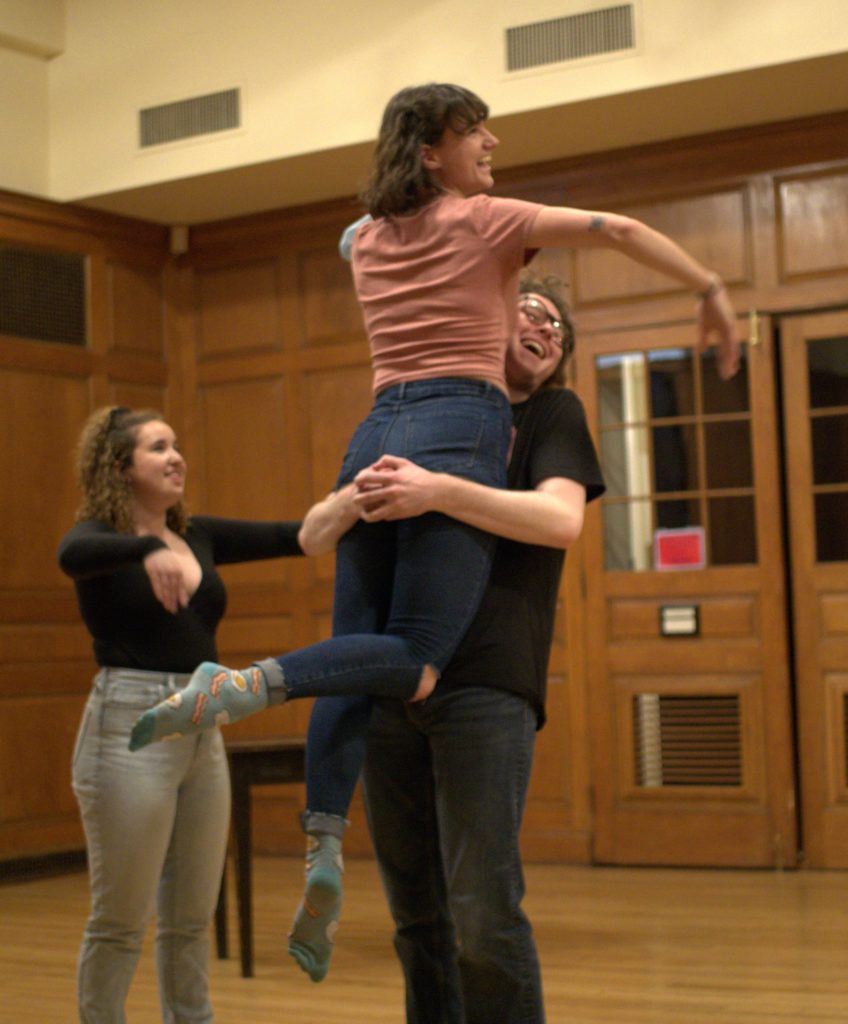
EPIC Players having some fun with Ellie Sondock’s choreography for Spelling Bee.
EPIC’s production of The 25th Annual Putnam County Spelling Bee, a musical comedy about a group of smartypants adolescent spellers whose search for meaning takes them beyond the dictionary, tackles a lot of the same questions of belonging, identity, self-expression, and acceptance addressed by EPIC’s mission. This isn’t an accident: EPIC sets out to produce shows that can be elevated by diverse casts. They don’t typically do shows featuring disabled characters, as the idea is that the actors at EPIC can play anyone.
“There is a real chance with Spelling Bee for us to have authentic and sincere portrayals of these characters and get out of the caricature of them,” Therrien explained. “I think our actors, especially those who identify as neurodivergent, are really going to find different levels to a Barfée, different levels to a Leaf, that are beyond just, ‘I have a lisp,’ or, ‘I have echolalia,’ which they say in the play—but what does that actually mean to somebody who is living with it?”
The Spelling Bee rehearsal is where I really got to see EPIC in action. Cast members were so invested in their characters that I found myself getting caught up in the competition.
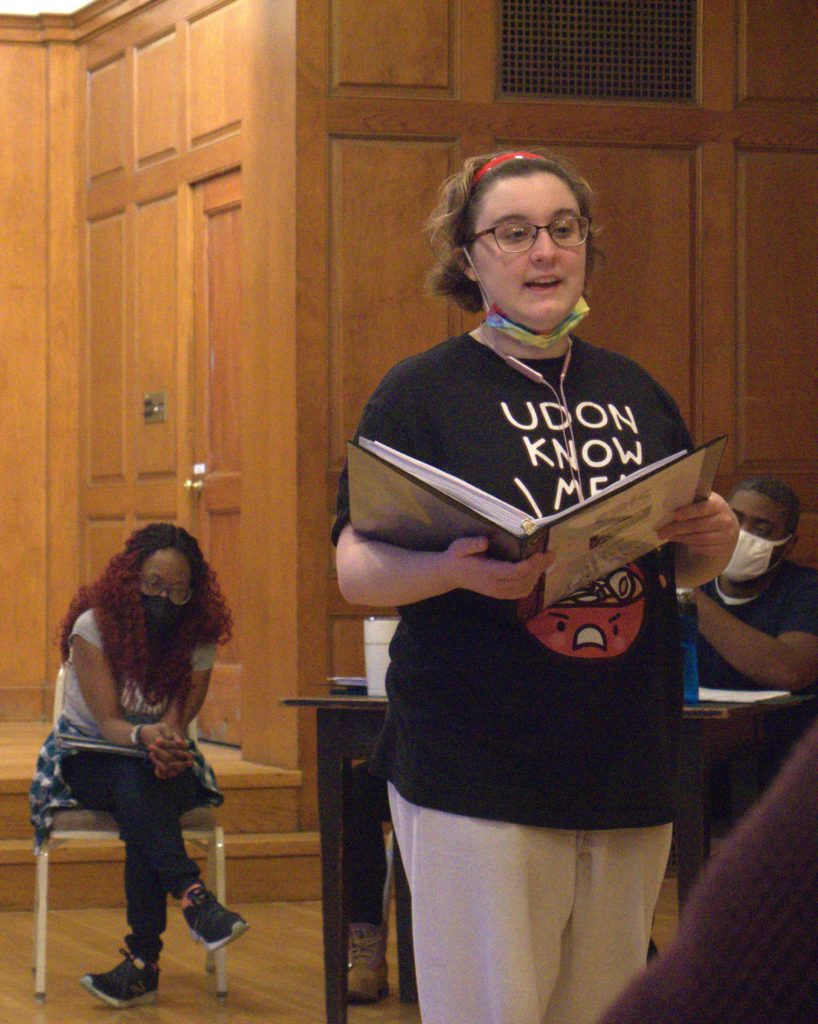
“I just started leaning towards Logainne,” said Natalie Kaiser of her Spelling Bee audition, referring to the show’s youngest competitor Logainne “Schwarzy” Schwartzandgrubenierre. “She’s so unique, and she’s so quirky, and I think she’s adorable. Everyone’s going to remember the character with the lisp. When I got the part, I was so excited. It was one of the best moments I’ve had in my whole life.”
While every competitive speller certainly faces pressure, Logainne feels a heightened responsibility to succeed on behalf of her overbearing dads. “I have felt like that,” said Kaiser. “I still feel like that today. But I’m trying to take it one step at a time, as they say.”
When Kaiser was young she began performing with ActionPlay, a company that provides inclusive arts and educational programs for those on the autism spectrum. She explained that the theatre has helped her find structure and a place to process the “crazy blob of stuff” she experiences living with autism. “I didn’t lash out or freak out or anything. I was able to keep a stable routine; I was able to keep a stable mind, and a stable attitude.”
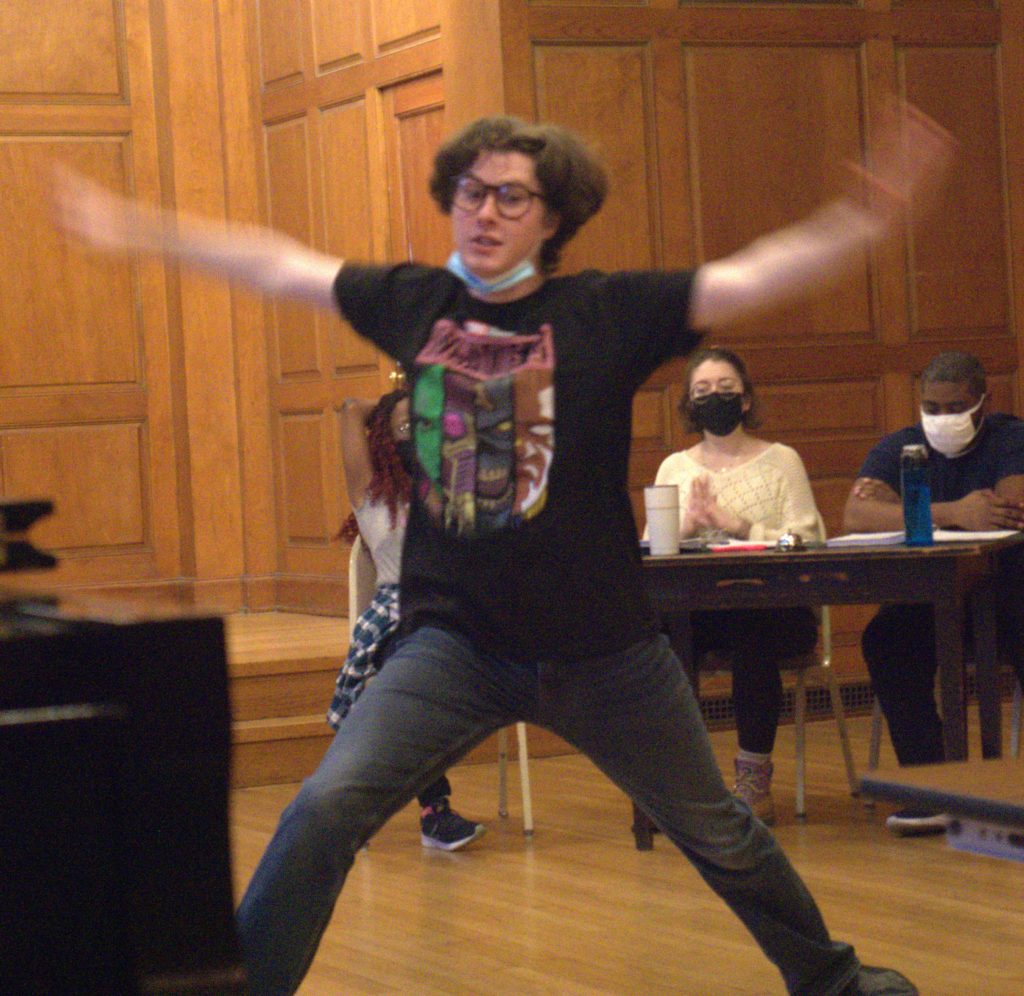
Fellow speller and ActionPlay alum Connor Tague plays William Morris Barfée. He said that, “Just being in the show with these people who are neurodivergent, it’s a really great place to fit in.” Claire Mercier, who plays newbie speller Olive Ostrovsky, said she relates to her character “in a lot of ways. I relate to her sense of being unsure and not really feeling like she belongs, and knowing what she’s supposed to do, but not knowing if that’s the right thing. She knows what she’s good at, but she doesn’t have the confidence to say, ‘I can do this and I’m gonna do this.’ I definitely relate to her struggles with friendships, especially as a 10-year-old girl. That was probably the hardest time of life. It’s a character that I’ve loved for a really long time.”
A fellow conservatory classmate of Ellie Sondock and Sarah Kaufman, Mercier was recently diagnosed with autism and ADHD.
“It’s been a really interesting experience,” Mercier explained, “because I have never been in an environment like this before. I never even really knew this part of me until right before joining EPIC. All or most of us might be neurodivergent, but that doesn’t mean we work the same way, and so it’s just been really cool to see everybody’s different strengths and the way that those are really celebrated in the company. Aubrie, Travis, and all the other directors are so good at meeting people where they’re at. That’s the whole point of this company. And they do that really well. You just come as you are, and we work together from there.”
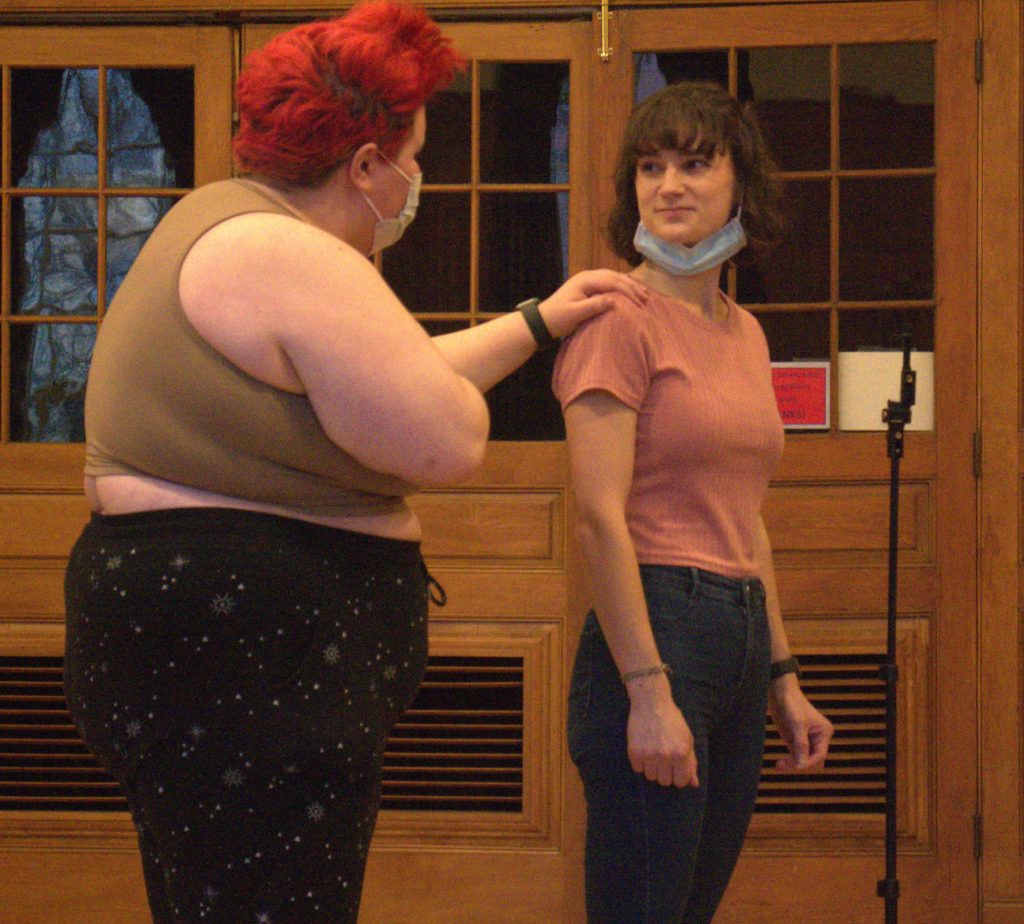
Mercier said the EPIC experience has provided her with a new perspective and made theatre feel personal again. “I think I’ve gotten back to a lot of things that maybe I lost throughout my acting and theatre training,” she said. The “rigidness” of her education, she said, meant that she “lost a lot of where I really come from. And since discovering my neurodiversity, and working more with EPIC, I’ve found so much more of what I used to love about theatre, and the reason I love acting, and the reason that I enjoy it, and the things that I bring to it. I was definitely hiding for a while. I don’t want to hide that part of myself in any way.”
Alexandra Pierson (she/her) is associate editor of American Theatre magazine. apierson@tcg.org





